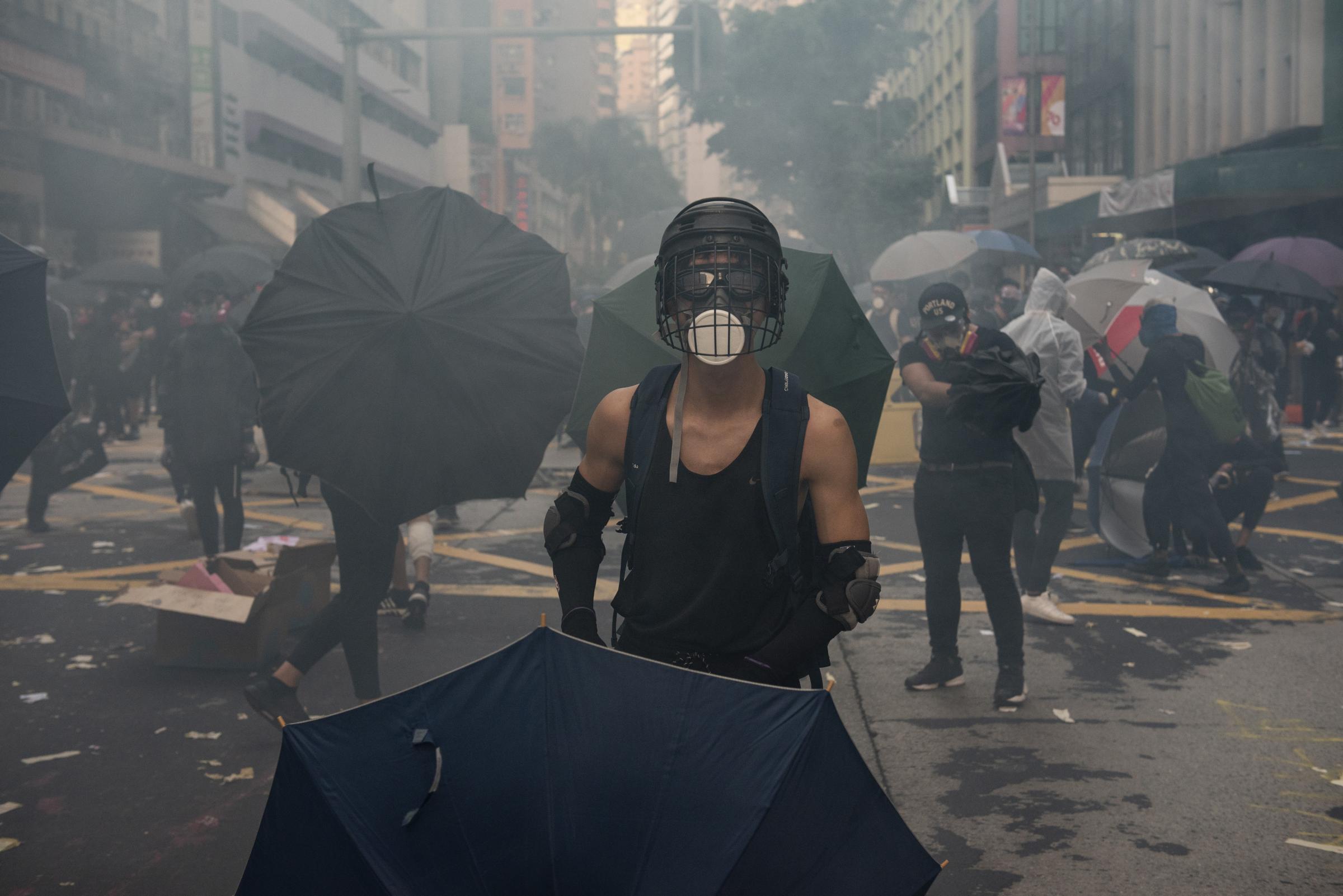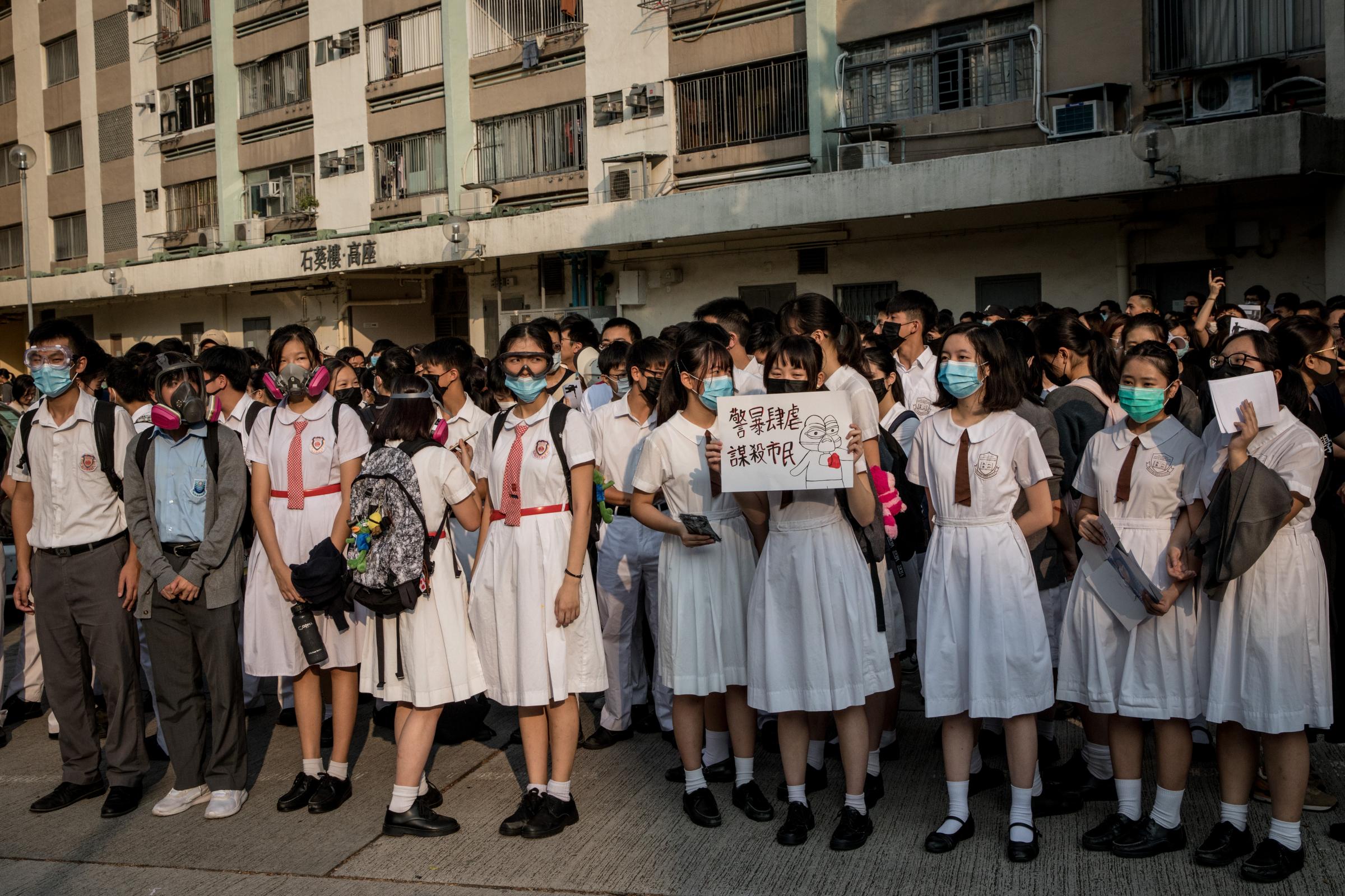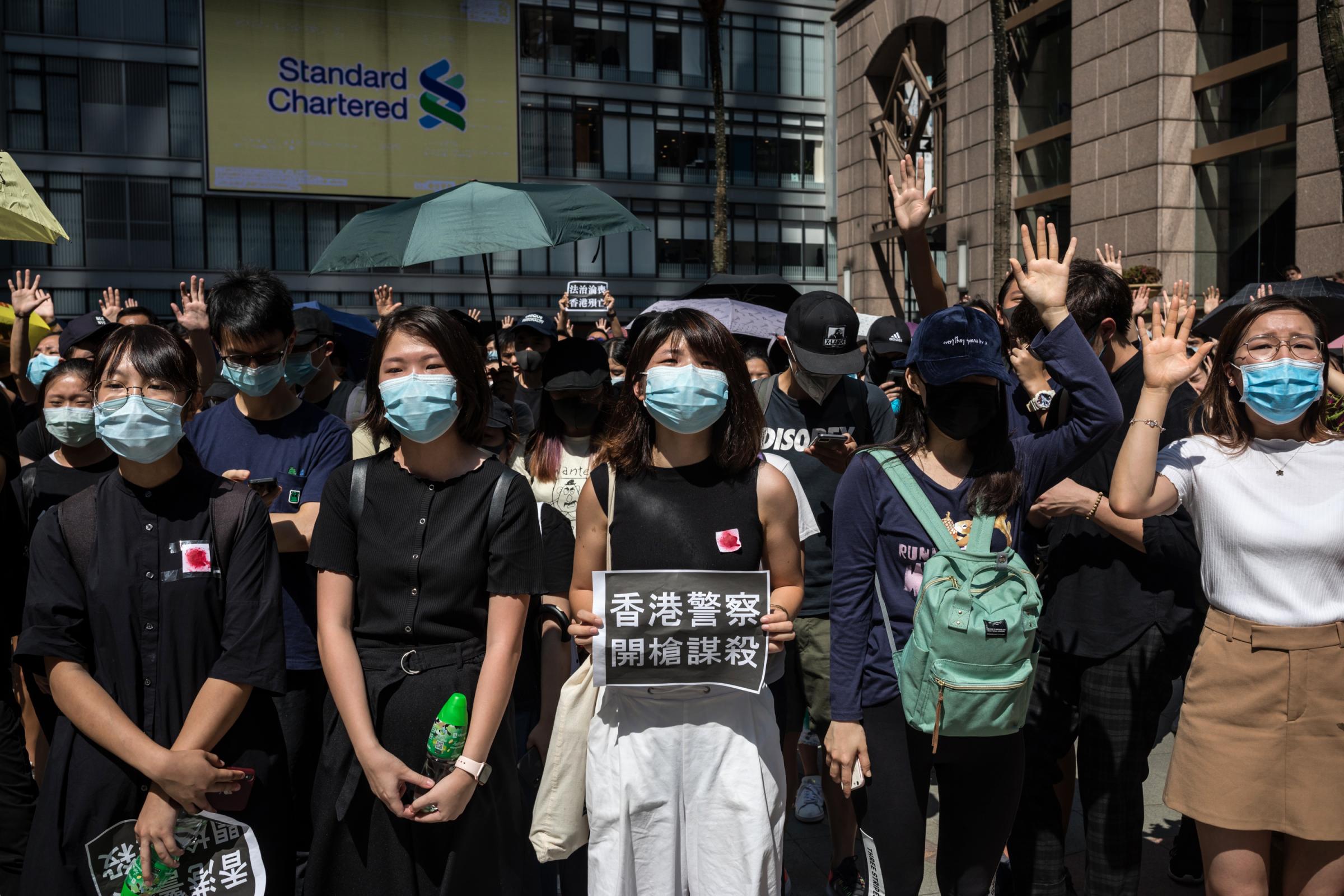Amid worsening political tensions, hundreds of protesters gathered in the streets of Hong Kong’s financial quarter from lunchtime Wednesday in a spontaneous demonstration of anger at the shooting of an 18-year-old protester during the enclave’s worst unrest in more than 50 years.
Suited office workers joined young, black-clad activists in marching through the streets of Central district chanting “Fight for freedom! Stand with Hong Kong!” They sang the democracy movement’s anthem, “Glory to Hong Kong,” as passing bus drivers and vehicle passengers leaned out of their windows to offer gestures of support. Some carried signs accusing the police of attempted murder.
“I think we really need foreign countries to intervene,” said Chun, a 20-year-old protester. “I don’t know how or what they can do, but it’s becoming clear we can’t fight this government alone”
The latest demonstration comes after thousands of young protesters rampaged across the city Tuesday, clashing with police, setting fires in government offices, and smashing the premises of businesses, organizations, and politicians with mainland Chinese connections.
The protester who was shot by police at close range has been identified as high school student Tony Tsang Chi-kin and is in hospital in stable condition. According to official figures, 25 police officers and 66 protesters were injured and 269 people arrested in the violence, which saw protesters attack the police with petrol bombs, rocks, poles, slingshots and other homemade weapons. One officer suffered third degree burns after he was attacked with corrosive liquid.
Police responded with 1,400 rounds of tear gas, hundreds of rubber bullets, water cannon, and several live rounds, but appeared unable to control the disturbances, which erupted in multiple districts across Hong Kong Island, the Kowloon peninsula and the suburban New Territories.
The government issued a statement late Tuesday condemning “online orchestration of violent acts in various districts across the territory” and what it called “very dangerous riots.” It accused those behind the disturbances of “leading Hong Kong to a chaotic and panic [sic] state.”

The police also issued a statement saying “Public safety has been jeopardized and the public order of the whole city is being pushed to the verge of a very dangerous situation.”
At a press conference Wednesday, Tang Ping-keung, deputy commissioner of police, defended the shooting of the young protester. “The use of force was lawful and reasonable,” he said. “Some say that it police who provoked the attack but this is wrong. At that time our colleagues were being chased and attacked by a large number of rioters.”
Democratic lawmaker Claudia Mo told TIME that the general situation in Hong Kong was “becoming so chaotic that I don’t know how we can carry on like this. Violence breeds violence. You can sense the anger and hostility and desperation of the young in particular.”
She called for the resignation of the enclave’s deeply unpopular top official. “I personally wish Carrie Lam would just quit,” Mo said. “We need a different face to lead Hong Kong. Whoever that is, there just may be a chance to restart things.”
Conservative lawmaker Michael Tien said that it was time for Hongkongers to have the right to choose their own leader through universal suffrage. Presently, the chief executive, as the head of the administration is known, is appointed by a college of just 1,200 carefully vetted and mostly pro-Beijing electors.
“I think increasingly the Hong Kong middle class feels there’s a need for it [universal suffrage] rather than having the chief executive elected by 1,200 people,” he told TIME. “We desperately need a chief executive that can connect with young people. None of the last four chief executives has been able to do this.”
‘Now everything has changed’
Meanwhile, hundreds of students and black shirted demonstrators staged a sit-in Wednesday morning at the Tsuen Wan Public Ho Chuen Yiu Memorial College—the school attended by Tsang, the teenager shot yesterday. Outside the school, protesters held up images from the shooting, taken from widely shared video of the incident. Alongside sidewalk guardrails decorated with strings of brightly colored paper cranes, the small assembled crowd shouted “Liberate Hong Kong, revolution of our time!”
A group of alumni, many of whom also donned the protesters’ black-shirt uniform, met with the principal to ask that the critically wounded student will be allowed back after he recovers from the bullet to the chest. (According to a local political party, bullet fragments were lodged just three centimeters from Tsang’s heart.) Alumni also pushed the administration to put out a statement condemning police violence.
As students from the school across the street were let out for lunch recess, the neighborhood ricocheted with a chorus of “Gaa yau”—a phrase literally meaning “add oil” that is used for exhortation and encouragement—and a rendition of “Glory to Hong Kong.” In both school yards, students in starched white shirts wandered around during the sweltering mid-day break in a daze, shocked that one of their own had been hit.
“It’s just unbelievable,” said a 16-year-old classmate of Tsang’s who asked that her name not be used. “We were talking about the protests in class just last week. Now everything has changed,” she added, holding back tears. “Yesterday, I could not sleep. I just kept re-watching the videos of him getting shot and then calling out for help, and asking to be taken to the hospital.”

Another classmate, who participated in an impromptu “Citizens Press Conference” outside the school Wednesday afternoon called Tsang “generous.”
“He has always been like a big brother to me and all my schoolmates,” said the student, who wore a mask to conceal his identity and declined to give a name. He added that Tsang at one point said “he would rather die than be arrested.”
Both students and protesters expressed alarm over the shooting of the teenager, who is the first protester to have been shot in the four-month-old movement. Shortly after the incident, a police spokeswoman defended the officer’s actions, saying in a Facebook video that he fired a live round to save his and a colleagues’ lives. Videos of the incident show a group of protesters, some of whom were armed with metal sticks, chasing and surrounding an officer who falls to the ground while another officer, with his firearm drawn, charges toward the group.
“There are so many other ways the police officer could have de-escalated the situation. He could’ve fired a warning shot in the air, or used any number of non-lethal methods, but instead he shot a secondary student in the heart. It’s just horrible,” said Yam, a 21-year-old alumna who asked to be identified only by her surname. “I’m worried with the escalation in clashes we are heading into a situation where we will see more people get hurt. It is mainly the police’s responsibility to prevent this from happening.”
The shooting is already galvanizing fresh anger against a police force many see as using increasingly brutal tactics. To some Hongkongers, Tsang is a martyr for the pro-democracy movement.
“Thank you for your sacrifice,” said Lai, 21, another alumna of Tsang’s school who also asked to be identified only by her surname.
‘They want to suppress our voices and silence us’
Later in the day, hundreds of people gathered at the West Kowloon Magistrates’ Court in support of 96 protesters facing rioting charges in the largest grouping of prosecutions since Hong Kong’s political crisis began in June. Many supporters were striking students in school uniform and expressed defiance in the wake of yesterday’s shooting.
“When I checked my phone yesterday and saw the news, I was heartbroken,” said a 16-year-old student named Lau. “I couldn’t sleep last night. This morning I woke up and I felt no better. I couldn’t make myself go to school, and I can’t imagine how others can sit in class normally like nothing happened. That’s why I decided to strike today. I think its the right thing to do.”
His 14-year-old friend said: “Even if it’s getting more and more dangerous, I won’t be afraid to come out. I won’t be scared because fear is exactly what our authoritarian government wants us to feel. They want to suppress our voices and silence us. We won’t let them do that.”
Students at a primary school opposite the court gathered on balconies and sang “Glory to Hong Kong” at the crowd outside the magistracy, who held up the protesters’ open-hand gesture—the five fingers each representing a core demand of the movement, which include universal suffrage and exoneration of all those arrested.
Hong Kong’s protesters chose yesterday—China’s national day—to unleash their most determined assault yet in support of those demands. Shortly after dignitaries watched the official flag raising ceremony behind closed doors, tens of thousands of people defied a police ban to march through the city’s downtown areas calling for an end to Beijing’s authoritarianism. The Chinese flag was burned and images of China’s president Xi Jinping defaced.
Much of the city was in lockdown. Malls pulled down their shutters, almost half of the city’s subway stations were closed, and streets that would normally be thronged with shoppers and strolling families were deserted in anticipation of trouble.
By the mid-afternoon, the peaceful march turned into street occupations. Hardline protesters erected barricades and fought running battles with police across a dozen districts. Others began smashing and vandalizing storefronts. Fires were lit across the city. Two regional government offices were seriously damaged and multiple subway stations came under attack by protesters who accuse the train system’s operator of colluding with police.

‘This is a very ominous sign’
Many are now wondering if the government will impose emergency powers to keep order. Local media reported late Wednesday that the Junior Police Officers Association, which represents 25,000 police officers, was calling on the government to impose a curfew.
“Yesterday marked a watershed towards more violence used by both protesters and the police. It seems the level of violence will continue and it could be raised by both sides,” said Willy Lam, adjunct professor at the Chinese University of Hong Kong’s Center for China Studies.
“What happened yesterday has boosted the possibility that at least parts of the [emergency powers] ordinance might be used, because things seem to be spinning out of control,” he told TIME.
Ronny Tong, a member of Carrie Lam’s cabinet, told TIME that “there will be very intense debate surrounding invoking the emergency power ordinance in the coming days.”
He said: “If you continue to see violence escalating daily, which might lead to fatalities, perhaps there is little choice.” He also pointed out that the police force was stretched to its limit. “If we can relieve some of that pressure, it will be quite useful, that’s another reason we should look at the emergency power regulations, it might lessen the strain on them.”
Willy Lam added that Beijing could also be expected to take a tougher line with the territory, which was retroceded to China in 1997 after 156 years of British colonial rule.
He said that in early September Zhao Kezhi, China’s top police officer, was appointed to a senior position in the Hong Kong and Macau Affairs Office.
“This is a very ominous sign,” Lam said, “that the top cop in China has been given control of Hong Kong affairs.”
Hong Kong has been roiled by four months of unrest. Early demonstrations against a now withdrawn extradition bill, which would have allowed the rendition of fugitives to mainland China for the first time, quickly grew into a democratic rebellion against the unpopular local government. Many protesters are also calling for self-determination or independence for Hong Kong.
—With reporting by Laignee Barron, Amy Gunia and Hillary Leung / Hong Kong
More Must-Reads from TIME
- Caitlin Clark Is TIME's 2024 Athlete of the Year
- Where Trump 2.0 Will Differ From 1.0
- Is Intermittent Fasting Good or Bad for You?
- The 100 Must-Read Books of 2024
- Column: If Optimism Feels Ridiculous Now, Try Hope
- The Future of Climate Action Is Trade Policy
- FX’s Say Nothing Is the Must-Watch Political Thriller of 2024
- Merle Bombardieri Is Helping People Make the Baby Decision
Contact us at letters@time.com